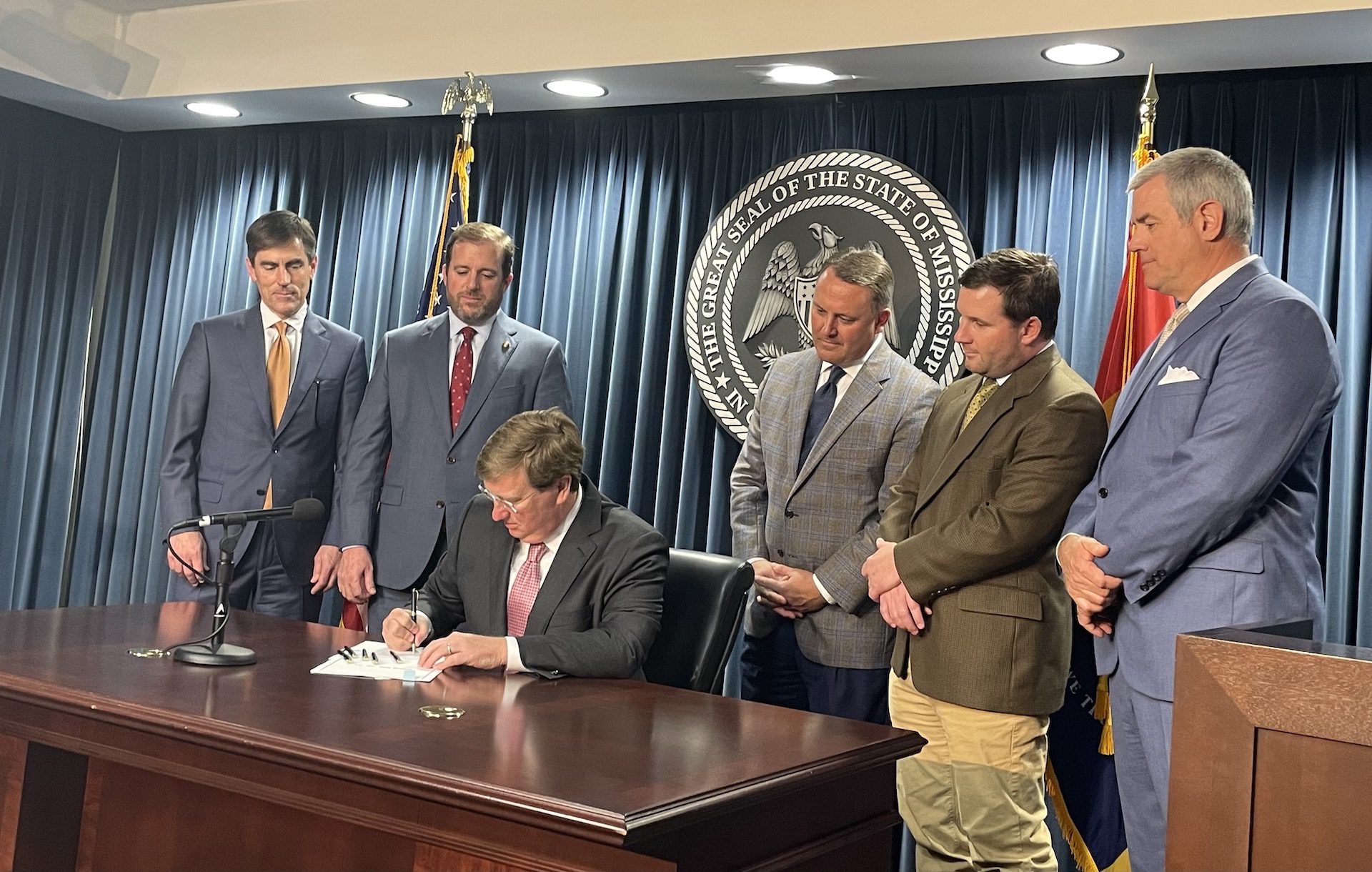
Governor Reeves signs House Bill 531, the Tax Freedom Act, on April 5, 2022.
Under the 2022 law, low income workers will pay no state income taxes on their earnings beginning this year.
Last year, Governor Tate Reeves signed Mississippi’s Tax Freedom Act into law. At the signing ceremony Reeves was flanked by legislative leaders, including outgoing Speaker Philip Gunn, who worked for two years to accomplish the reforms.
The result is the largest tax cut in Mississippi history. But more specifically, one that focuses first on everyday workers.
Beginning this year, Mississippi now has the highest tax exemption in the country among states that collect income taxes. Single filers will not pay any income taxes on the first $18,300 of their income this year. Married couples filing jointly will not pay any income taxes on the first $36,600 in income this year.
For context, the federal poverty level is $14,580 for a single-person household and $35,140 for a five-person household. This means that the overwhelming majority of people in the category of “working poor” in Mississippi will not pay any income tax starting this year.
It also means that middle class families who are struggling to make ends meet in a high inflation environment will be able to take home more tax free dollars before any income tax liability kicks in.
For the dollars earned above the exemption levels, the Tax Freedom Act also includes relief. Over a three-year period between 2024 and 2026, the tax rate applied to all income over the exemption threshold will be reduced to a simple and low four percent flat tax.
The estimated tax savings for Mississippi workers when the Tax Freedom Act is fully phased in is over $500 million. Those are dollars put back in the pockets of Mississippi’s working families to invest in their own wellbeing, their businesses, and their communities.
The Road to Reform
Mississippi previously operated with three income-tax brackets. To get to the current exemption levels, it eliminated two of the three. Between 2016 and 2021, the state phased out the 3 percent bracket that applied to the first $5,000 in taxable income. This was part of the Taxpayer Pay Raise Act spearheaded by then-Lt. Governor Reeves.
This year, the 4 percent bracket that applied to the next $5,000 in taxable income has been eliminated under the Tax Freedom Act.
The agreement on the Tax Freedom Act came after two years of intense public debate between the state’s Republican leadership, with Governor Reeves and Speaker Gunn calling for complete repeal of the income tax.
The Mississippi House passed plans for full elimination in hopes of joining Tennessee, Texas, and Florida among states that operate without an income tax. The case for gradual elimination was bolstered by back-to-back billion-dollar state revenue surpluses in fiscal years 2021 and 2022, along with over $4 billion accumulated in reserves.
Those plans ran into roadblocks in the Mississippi Senate. Senators raised concerns about the sustainability of the state’s current revenue picture and the need to make investments in certain government services that were perceived as neglected. Those concerns were founded, in part, on questions about the revenue-boosting effect of the $35 billion in federal aid that poured into Mississippi during the COVID pandemic.
What’s Next?
The reform begs the question of what is next. Governor Reeves continues to hold out as a goal the complete elimination of the income tax. Were Mississippi successful in doing so, it would become the tenth state to operate without one.
In polling performed by Mason-Dixon Polling this month in partnership with Magnolia Tribune, Mississippians, informed about recent government surpluses, were asked if they would support income tax elimination – 61 percent of those polled voiced support, with only 20 percent voicing opposition. Republicans and Independents were particularly supportive, 70 percent and 64 percent, respectively. A plurality of Democrats, 48 percent, voiced support for the policy.
States that operate without an income tax, on average, have experienced double the population growth, considerably higher economic growth, and higher wages than the national average.











